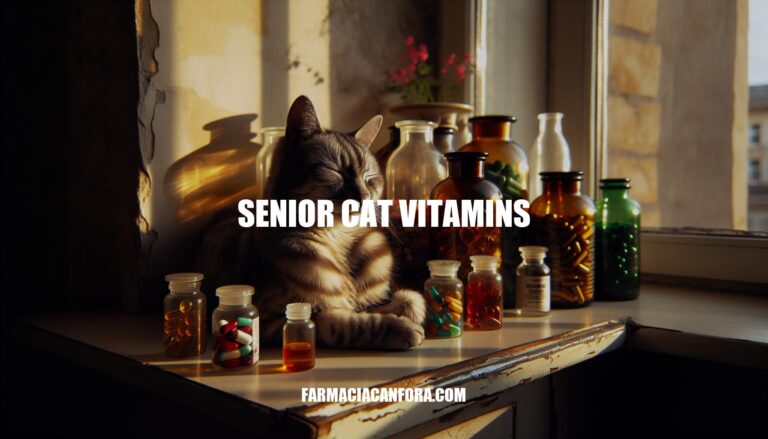


As cats age, their nutritional needs change, making it crucial to provide them with the right vitamins. Senior cat vitamins play a vital role in maintaining their health and well-being by supporting joint health, boosting the immune system, and enhancing cognitive function. Ensuring your aging feline gets these essential nutrients can help them stay active and happy in their golden years.
Here are the specific benefits of senior cat vitamins:
Improved Joint Health: Senior cat vitamins often contain glucosamine and chondroitin, which help maintain healthy cartilage and reduce joint inflammation. This can alleviate stiffness and discomfort, making it easier for older cats to move around.
Enhanced Immune Function: Vitamins like A, E, and antioxidants boost the immune system, helping senior cats fight off infections and stay healthy. Colostrum, rich in antibodies, also supports immune health.
Better Skin and Coat Condition: Omega fatty acids, commonly found in senior cat vitamins, improve skin health and promote a shiny coat. They also help reduce inflammation, benefiting overall skin condition.
Here are the essential vitamins for senior cats and their roles:
Vitamin A: Vital for maintaining healthy skin and vision. It also supports the immune system and helps with cell growth and differentiation.
Vitamin D: Crucial for calcium absorption, which is necessary for strong bones and teeth. It also supports muscle function and the immune system.
Vitamin E: Acts as an antioxidant, protecting cells from damage. It supports the immune system and skin health, and is particularly important for cats on a fish-based diet due to the high levels of polyunsaturated fatty acids in fish.
B-Complex Vitamins:
These vitamins collectively support various aspects of a senior cat’s health, including immune function, skin and coat health, vision, bone strength, and overall metabolic processes.
Here are some guidelines for selecting the best senior cat vitamins:
Consult Your Veterinarian: Always start by consulting your vet to ensure the vitamins are appropriate for your cat’s specific needs.
Quality Ingredients: Look for high-quality ingredients. Avoid artificial additives and fillers.
Specific Formulation: Choose vitamins specifically formulated for senior cats to address their unique health needs.
Essential Nutrients: Ensure the vitamins include essential nutrients like taurine, omega-3 fatty acids, and antioxidants.
Reputable Brands: Opt for products from reputable brands that are veterinarian-approved.
Ease of Administration: Select vitamins that are easy to administer, such as chewable tablets or liquid forms.
Following these guidelines will help you choose the best vitamins to support your senior cat’s health.
Here are some tips and methods for effectively administering vitamins to your senior cat:
These methods can help ensure your senior cat gets the full benefits of their vitamins.
Consulting with a veterinarian ensures your senior cat gets the right supplements safely.
Senior cat vitamins play a vital role in maintaining the health and well-being of aging felines by supporting joint health, boosting the immune system, and enhancing cognitive function.
They contain essential nutrients like glucosamine, chondroitin, omega fatty acids, and antioxidants that help alleviate stiffness, reduce inflammation, and promote overall skin and coat health.
Vitamins A, D, E, and B-complex are particularly important for senior cats, supporting vision, bone strength, immune function, and nerve health.
When selecting a vitamin supplement for your senior cat, consult with your veterinarian to ensure the right formulation and dosage. Look for high-quality ingredients, essential nutrients, and reputable brands.
Effective administration methods include mixing with food, using treats or pill pockets, and incorporating routine and positive reinforcement.
While potential side effects and precautions exist, consulting with a veterinarian ensures safe and effective use of senior cat vitamins.